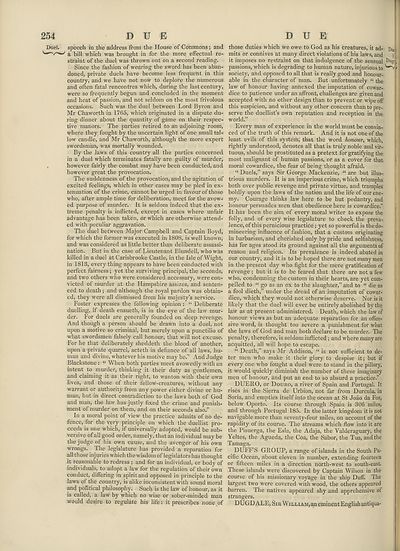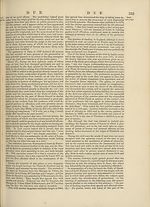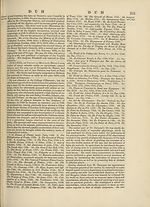Encyclopaedia Britannica > Volume 8, DIA-England
(264) Page 254
Download files
Complete book:
Individual page:
Thumbnail gallery: Grid view | List view

DUE DUE
speech in the address from the House of Commons; and
a bill which was brought in for the more effectual re¬
straint of the duel was thrown out on a second reading.
Since the fashion of wearing the sword has been aban¬
doned, private duels have become less frequent in this
country, and we have not now to deplore the numerous
and often fatal rencontres which, during the last century,
were so frequently begun and concluded in the moment
and heat of passion, and not seldom on the most frivolous
occasions. Such was the duel between Lord Byron and
Mr Chaworth in 1765, which originated in a dispute du¬
ring dinner about the quantity of game on their respec¬
tive manors. The parties retired to an adjoining room,
where they fought by the uncertain light of one small tal¬
low candle, and Mr Chaworth, although the more expert
swordsman, was mortally wounded.
By the laws of this country all the parties concerned
in a duel which terminates fatally are guilty of murder,
however fairly the combat may have been conducted, and
however great the provocation.
The suddenness of the provocation, and the agitation of
excited feelings, which in other cases may be pled in ex¬
tenuation of the crime, cannot be urged in favour of those
who, after ample time for deliberation, meet for the avow¬
ed purpose of murder. It is seldom indeed that the ex¬
treme penalty is inflicted, except in cases where unfair
advantage has been taken, or which are otherwise attend¬
ed with peculiar aggravation.
The duel between Major Campbell and Captain Boyd,
for which the former was executed in 1808, is well known,
and was considered as little better than deliberate assassi¬
nation. But in the case of Lieutenant Blundell, who was
killed in a duel at Carisbrooke Castle, in the Isle of Wight,
in 1813, every thing appears to have been conducted with
perfect fairness ; yet the surviving principal, the seconds,
and two others who were considered accessary, were con¬
victed of murder at the Hampshire assizes, and senten¬
ced to death; and although the royal pardon was obtain¬
ed, they were all dismissed from his majesty’s service.
Foster expresses the following opinion: “ Deliberate
duelling, if death ensueth, is in the eye of the law mur¬
der. For duels are generally founded on deep revenge.
And though a person should be drawn into a duel, not
upon a motive so criminal, but merely upon a punctilio of
what swordsmen falsely call honour, that will not excuse.
For he that deliberately sheddeth the blood of another,
upon a private quarrel, acteth in defiance of all laws, hu¬
man and divine, whatever his motive may be.” And Judge
Blackstone : “ When both parties meet avowedly with an
intent to murder, thinking it their duty as gentlemen,
and claiming it as their right, to wanton with their own
lives, and those of their fellow-creatures, without any
warrant or authority from any power either divine or hu¬
man, but in direct contradiction to the laws both of God
and man, the law has justly fixed the crime and punish¬
ment of murder on them, and on their seconds also.”
In a moral point of view the practice admits of no de¬
fence, for the very principle on which the duellist pro¬
ceeds is one which, if universally adopted, would be sub¬
versive of all good order, namely, that an individual may be
the judge of his own cause, and the avenger of his own
wrongs. The legislature has provided a reparation for
all those inj uries which the wisdom of legislators has thought
it reasonable to redress ; and for an individual, or body of
individuals, to adopt a law for the regulation of their own
conduct, differing in spirit and opposed in principle to the
laws of the country, is alike inconsistent with sound moral
and political philosophy. Such is the law of honour, as it
is called, a law by which no wise or sober-minded man
would desire to regulate his life: it prescribes none of
those duties which we owe to God as his creatures, it ad- But
mits or connives at many direct violations of his laws, and |i
it imposes no restraint on that indulgence of the sensual huge
passions, which is degrading to human nature, injurious to
society, and opposed to all that is really good and honour¬
able in the character of man. But unfortunately “ the
law of honour having annexed the imputation of cowar¬
dice to patience under an affront, challenges are given and
accepted with no other design than to prevent or wipe off
this suspicion, and without any other concern than to pre¬
serve the duellist’s own reputation and reception in the
world.”
Every man of experience in the world must be convin¬
ced of the truth of this remark. And it is not one of the
least evils of this system, that the word honour^ which,
rightly understood, denotes all that is truly noble and vir¬
tuous, should be prostituted as a pretext for gratifying the
most malignant of human passions, or as a cover for that
moral cowardice, the fear of being thought afraid.
“ Duels,” says Sir George Mackenzie, “ are but illus¬
trious murders. It is an imperious crime, which triumphs
both over public revenge and private virtue, and tramples
boldly upon the laws of the nation and the life of our ene¬
my. Courage thinks law here to be but pedantry, and
honour persuades men that obedience here is cowardice.”
It has been the aim of every moral writer to expose the
folly, and of every wise legislature to check the preva¬
lence, of this pernicious practice; yet so powerful is the do¬
mineering influence of fashion, that a custom originating
in barbarism, and cherished only by pride and selfishness,
has for ages stood its ground against all the arguments of
reason and religion. Its prevalence is indeed abated in
our country, and it is to be hoped there are not many men
in the present day who fight for the mere gratification of
revenge ; but it is to be feared that there are not a few
who, condemning the custom in their hearts, are yet com¬
pelled to “ go as an ox to the slaughter,” and to “ die as
a fool dieth,” under the dread of an imputation of cowar¬
dice, which they would not otherwise deserve. Nor is it
likely that the duel will ever be entirely abolished by the
law as at present administered. Death, which the law of
honour views as but an adequate reparation for an offen¬
sive word, is thought too severe a punishment for what
the laws of God and man both declare to be murder. The
penalty, therefore, is seldom inflicted; and where many are
acquitted, all will hope to escape.
“ Death,” says Mr Addison, “ is not sufficient to de¬
ter men who make it their glory to despise it; but if
every one who fought a duel were to stand in the pillory,
it would quickly diminish the number of these imaginary
men of honour, and put an end to so absurd a practice.”
DUERO, or Douro, a river of Spain and Portugal. It
rises in the Sierra de Urbion, not far from Durcula, in
Soria, and empties itself into the ocean at St Joao da Foz,
below Oporto. Its course through Spain is 306 miles,
and through Portugal 185. In the latter kingdom it is not
navigable more than seventy-four miles, on account of the
rapidity of its course. The streams which flow into it are
the Pisuerga, the Esla, the Adaja, the Valderaguary, the
Yeltes, the Agueda, the Coa, the Sabor, the Tua, and the
Tamaga.
DUFF’S GROUP, a range of islands in the South Pa¬
cific Ocean, about eleven in number, extending fourteen
or fifteen miles in a direction north-west to south-east.
These islands were discovered by Captain Wilson in the
course of his missionary voyage in the ship Duff. The
largest two were covered with wood, the others appeared
barren. The natives appeared shy and apprehensive of
strangers.
DUGD ALE, Sir Willi am, an eminent English antiqua-
speech in the address from the House of Commons; and
a bill which was brought in for the more effectual re¬
straint of the duel was thrown out on a second reading.
Since the fashion of wearing the sword has been aban¬
doned, private duels have become less frequent in this
country, and we have not now to deplore the numerous
and often fatal rencontres which, during the last century,
were so frequently begun and concluded in the moment
and heat of passion, and not seldom on the most frivolous
occasions. Such was the duel between Lord Byron and
Mr Chaworth in 1765, which originated in a dispute du¬
ring dinner about the quantity of game on their respec¬
tive manors. The parties retired to an adjoining room,
where they fought by the uncertain light of one small tal¬
low candle, and Mr Chaworth, although the more expert
swordsman, was mortally wounded.
By the laws of this country all the parties concerned
in a duel which terminates fatally are guilty of murder,
however fairly the combat may have been conducted, and
however great the provocation.
The suddenness of the provocation, and the agitation of
excited feelings, which in other cases may be pled in ex¬
tenuation of the crime, cannot be urged in favour of those
who, after ample time for deliberation, meet for the avow¬
ed purpose of murder. It is seldom indeed that the ex¬
treme penalty is inflicted, except in cases where unfair
advantage has been taken, or which are otherwise attend¬
ed with peculiar aggravation.
The duel between Major Campbell and Captain Boyd,
for which the former was executed in 1808, is well known,
and was considered as little better than deliberate assassi¬
nation. But in the case of Lieutenant Blundell, who was
killed in a duel at Carisbrooke Castle, in the Isle of Wight,
in 1813, every thing appears to have been conducted with
perfect fairness ; yet the surviving principal, the seconds,
and two others who were considered accessary, were con¬
victed of murder at the Hampshire assizes, and senten¬
ced to death; and although the royal pardon was obtain¬
ed, they were all dismissed from his majesty’s service.
Foster expresses the following opinion: “ Deliberate
duelling, if death ensueth, is in the eye of the law mur¬
der. For duels are generally founded on deep revenge.
And though a person should be drawn into a duel, not
upon a motive so criminal, but merely upon a punctilio of
what swordsmen falsely call honour, that will not excuse.
For he that deliberately sheddeth the blood of another,
upon a private quarrel, acteth in defiance of all laws, hu¬
man and divine, whatever his motive may be.” And Judge
Blackstone : “ When both parties meet avowedly with an
intent to murder, thinking it their duty as gentlemen,
and claiming it as their right, to wanton with their own
lives, and those of their fellow-creatures, without any
warrant or authority from any power either divine or hu¬
man, but in direct contradiction to the laws both of God
and man, the law has justly fixed the crime and punish¬
ment of murder on them, and on their seconds also.”
In a moral point of view the practice admits of no de¬
fence, for the very principle on which the duellist pro¬
ceeds is one which, if universally adopted, would be sub¬
versive of all good order, namely, that an individual may be
the judge of his own cause, and the avenger of his own
wrongs. The legislature has provided a reparation for
all those inj uries which the wisdom of legislators has thought
it reasonable to redress ; and for an individual, or body of
individuals, to adopt a law for the regulation of their own
conduct, differing in spirit and opposed in principle to the
laws of the country, is alike inconsistent with sound moral
and political philosophy. Such is the law of honour, as it
is called, a law by which no wise or sober-minded man
would desire to regulate his life: it prescribes none of
those duties which we owe to God as his creatures, it ad- But
mits or connives at many direct violations of his laws, and |i
it imposes no restraint on that indulgence of the sensual huge
passions, which is degrading to human nature, injurious to
society, and opposed to all that is really good and honour¬
able in the character of man. But unfortunately “ the
law of honour having annexed the imputation of cowar¬
dice to patience under an affront, challenges are given and
accepted with no other design than to prevent or wipe off
this suspicion, and without any other concern than to pre¬
serve the duellist’s own reputation and reception in the
world.”
Every man of experience in the world must be convin¬
ced of the truth of this remark. And it is not one of the
least evils of this system, that the word honour^ which,
rightly understood, denotes all that is truly noble and vir¬
tuous, should be prostituted as a pretext for gratifying the
most malignant of human passions, or as a cover for that
moral cowardice, the fear of being thought afraid.
“ Duels,” says Sir George Mackenzie, “ are but illus¬
trious murders. It is an imperious crime, which triumphs
both over public revenge and private virtue, and tramples
boldly upon the laws of the nation and the life of our ene¬
my. Courage thinks law here to be but pedantry, and
honour persuades men that obedience here is cowardice.”
It has been the aim of every moral writer to expose the
folly, and of every wise legislature to check the preva¬
lence, of this pernicious practice; yet so powerful is the do¬
mineering influence of fashion, that a custom originating
in barbarism, and cherished only by pride and selfishness,
has for ages stood its ground against all the arguments of
reason and religion. Its prevalence is indeed abated in
our country, and it is to be hoped there are not many men
in the present day who fight for the mere gratification of
revenge ; but it is to be feared that there are not a few
who, condemning the custom in their hearts, are yet com¬
pelled to “ go as an ox to the slaughter,” and to “ die as
a fool dieth,” under the dread of an imputation of cowar¬
dice, which they would not otherwise deserve. Nor is it
likely that the duel will ever be entirely abolished by the
law as at present administered. Death, which the law of
honour views as but an adequate reparation for an offen¬
sive word, is thought too severe a punishment for what
the laws of God and man both declare to be murder. The
penalty, therefore, is seldom inflicted; and where many are
acquitted, all will hope to escape.
“ Death,” says Mr Addison, “ is not sufficient to de¬
ter men who make it their glory to despise it; but if
every one who fought a duel were to stand in the pillory,
it would quickly diminish the number of these imaginary
men of honour, and put an end to so absurd a practice.”
DUERO, or Douro, a river of Spain and Portugal. It
rises in the Sierra de Urbion, not far from Durcula, in
Soria, and empties itself into the ocean at St Joao da Foz,
below Oporto. Its course through Spain is 306 miles,
and through Portugal 185. In the latter kingdom it is not
navigable more than seventy-four miles, on account of the
rapidity of its course. The streams which flow into it are
the Pisuerga, the Esla, the Adaja, the Valderaguary, the
Yeltes, the Agueda, the Coa, the Sabor, the Tua, and the
Tamaga.
DUFF’S GROUP, a range of islands in the South Pa¬
cific Ocean, about eleven in number, extending fourteen
or fifteen miles in a direction north-west to south-east.
These islands were discovered by Captain Wilson in the
course of his missionary voyage in the ship Duff. The
largest two were covered with wood, the others appeared
barren. The natives appeared shy and apprehensive of
strangers.
DUGD ALE, Sir Willi am, an eminent English antiqua-
Set display mode to:
![]() Universal Viewer |
Universal Viewer | ![]() Mirador |
Large image | Transcription
Mirador |
Large image | Transcription
Images and transcriptions on this page, including medium image downloads, may be used under the Creative Commons Attribution 4.0 International Licence unless otherwise stated. ![]()
| Encyclopaedia Britannica > Encyclopaedia Britannica > Volume 8, DIA-England > (264) Page 254 |
|---|
| Permanent URL | https://digital.nls.uk/193326437 |
|---|
| Attribution and copyright: |
|
|---|
| Description | Ten editions of 'Encyclopaedia Britannica', issued from 1768-1903, in 231 volumes. Originally issued in 100 weekly parts (3 volumes) between 1768 and 1771 by publishers: Colin Macfarquhar and Andrew Bell (Edinburgh); editor: William Smellie: engraver: Andrew Bell. Expanded editions in the 19th century featured more volumes and contributions from leading experts in their fields. Managed and published in Edinburgh up to the 9th edition (25 volumes, from 1875-1889); the 10th edition (1902-1903) re-issued the 9th edition, with 11 supplementary volumes. |
|---|---|
| Additional NLS resources: |
|

